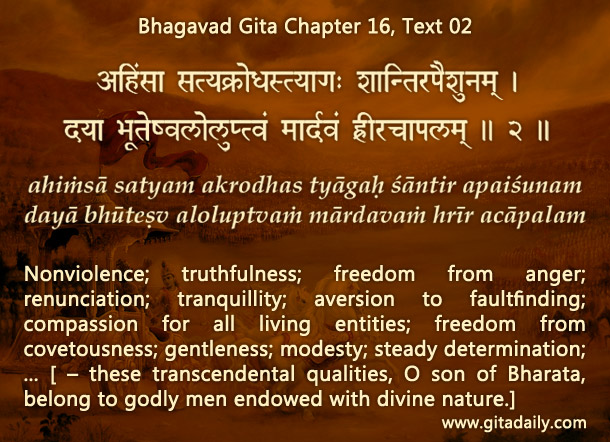To be nice is not to be naive — it is to be free from the control of vice
Some people say, “If you are nice, you will be exploited by others.”
They equate being nice with being naive, with the starry-eyed belief that everyone is good and kind and trustworthy. The naive are headed for a big shock.
If we want to survive in the rough-and-tumble of life, we can’t be naive. But we can still be nice. Being nice means that we aren’t controlled by vice; that we aren’t driven by envy, greed, anger etc in our dealings with others; that we are courteous toward others even while sticking to our principles and purposes. Pertinently, the Bhagavad-gita (16.02) states that the godly are gentle and are averse to faultfinding — they are nice in the sense that they aren’t harsh or hypercritical.
Ultimately, the difference between being nice and being naive boils down to adherence to dharma. Dharma centers on the roles we play and the duties we do. While doing the right thing, we can strive to be polite and gentle. But if someone stops us from doing our dharma, then we need to take a firm stand, even if that doesn’t look nice.
The Pandavas exemplify being nice without being naive. When Duryodhana abused and defrauded them, his father, Dhritarashtra, tried to weasel out a solution that let Duryodhana keep all his ill-gotten gains while leaving the Pandavas with nothing to even survive or do their dharma. The Pandavas didn’t naively fall for Dhritarashtra’s ruse. Yet after they neutralized Duryodhana in the Kurukshetra war, they didn’t target Dhritarashtra; they gave him the honor due to a father figure.
Thus, being nice doesn’t mean being naive — it means being firmly devoted to virtue without becoming dominated by vice.
Think it over:
- What is the problem with being naive?
- What is the essential difference between being naive and being nice?
- In your relationships, how can you better tread the line between being naive and giving in to vice?
***
16.02 Nonviolence; truthfulness; freedom from anger; renunciation; tranquillity; aversion to faultfinding; compassion for all living entities; freedom from covetousness; gentleness; modesty; steady determination; … [– these transcendental qualities, O son of Bharata, belong to godly men endowed with divine nature.]
To know more about this verse, please click on the image
Explanation of article:

Podcast:



Be nice.and control vice
Beautiful article with a different perspective.
I liked the lines: “Being nice means that we aren’t controlled by vice;…” …”the difference between being nice and being naive boils down to adherence to dharma.”
Thanks for the specific appreciation. Happy to be of service.
I also liked same points as Radha Damodar pr. Also the point, Being nice means that we aren’t controlled by vice; that we aren’t driven by envy, greed, anger . In the beginning years of my spiritual life, other’s anger/envy made me angry/envious. But now I see them while interacting with others, but don’t identify with them. I am able to be still nice to them most of times. I either overlook those negative situations/people or sometimes feel compassion for them. Sometimes I pray for them. One of my Gita guide says spiritual life has no space for any negative thoughts.
Thanks for the insightful comment.